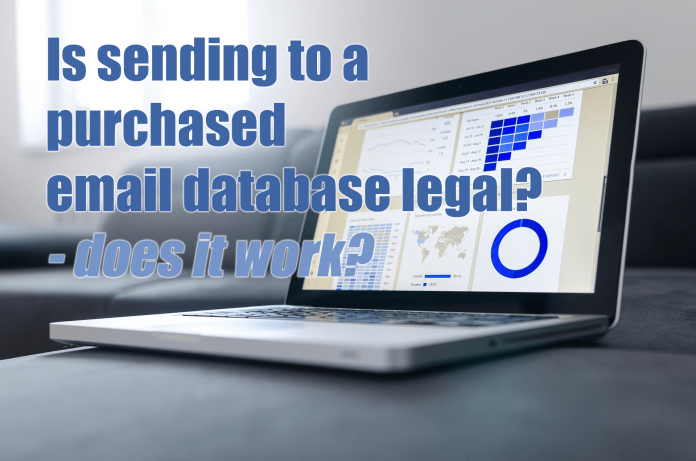If you are getting started with email marketing, the quickest way to get up and running with your email database is to buy a pre-made one. A quick search on google will present you with a myriad of data providers who are willing to sell you huge quantities of email addresses. But, is it legal to buy email lists?
This raises the question, and one I often get asked by new enquiries:
Can I cold email to a purchased list?
The law in a nutshell
As we are a UK based company, we are going to discuss anti-spam laws in the UK. If you are using an American supplier, you will want to check out the CAN-SPAM act.
In a nutshell, here is what you can and can’t do when it comes to the law and email marketing:
> You CAN email anyone that has opted-in to receive email from you. So your subscribers may have completed a newsletter subscribe box on your website. This applies to both business and consumer contacts.
> You CANNOT cold email consumers (private individuals) who have not asked to receive emails directly from your company (3rd party/purchased lists/bulk email databases cannot be used).
> You CAN cold email businesses addresses when the promotion is business to business and IS RELATED TO THEIR WORK.
> You CANNOT cold email sole traders or partnerships in England and Wales. In the eyes of the law, these are individuals and not legal companies.
In addition to the above regulations, any commercial email which you send must:
- Clearly identify who it is from.
- Provide a clear opt-out mechanism.
What will happen if I break the law?
Anti-spam law in the UK is enforced by the Information Commissioner, this body can fine your business £5,000 for any breaches in the law.
In May 2018, these laws were updated, with the introduction of GDPR. Please visit the following page for more information on GDPR:
Further reading on GDPR:
How does GDPR affect Email Marketing?
| Open A FREE account |
Side Note:
On the 30th September 2015, an energy company was fined £200,000 for breaking regulations relating to cold telephone calling. This same law applies to email. The defendant used the argument that they were not aware of the law, this was not perceived to be a valid defence.
Spam Filtering Companies
In addition to following the law, when it comes to sending a cold email, I would recommend considering terms of service from spam filtering companies (these are the guys who filter email for people inboxes).
Many spam filtering companies look quite negatively when it comes to cold and purchased data:
“The Golden Rule is: Never buy email addresses from anyone….Sending any bulk email to an address list purchased from a third party is guaranteed to get you in trouble for spamming since none of the owners of the addresses on the purchased list gave you consent to subscribe them to your list. “
— Spamhaus. (http://www.spamhaus.org/faq/section/Marketing%20FAQs)
Spam filtering companies, a few things to consider:
- Purchased and cold emails generate high levels of spam complaints. Too many, spam filtering companies will blacklist you (prevent you from emailing users who they protect).
- Spam traps. Purchased lists often include spam traps (dummy inboxes set up to catch unsolicited mail). Emailing one will cause your company to get blacklisted.
Note: Getting blacklisted will often result in high levels of your emails getting rejected when attempting delivery.
What is the best approach?
When asked, I always urge businesses to take the time to build their own opt-in database. We have a few videos over here to help you get started:
> Create and grow the best email marketing list (Part 1).
> Create and grow the best email marketing list (Part 2).
The advantage of this approach is that everyone in your database has asked to receive emails directly from you. You are not cold emailing. This means that you can rest assured you won’t attract the attention of the Information Commissioner or spam filtering companies. Open and response rates are normally much much higher (as the users have asked to receive your emails).
I really want to buy, what is your best advice?
If you want to go down the route of buying/renting a list of email addresses, I would ask your data supplier the following questions:
1. How have users asked to receive 3rd party emails? Simply stating that they are COI (confirmed opt-in) is not enough. Remember to ask for details of their opt-in procedure.
2. How many other companies are using this database? If the list has been sold to half the world. Users on the list will be bombarded with marketing emails. Chances are they will not read your email as they are getting swamped.
3. How often do you refresh data? Any good list supplier should ask every user if they wish to remain on their database at least once every three months.
4. Are these all business addresses? Are there any sole traders or partnerships on the list? (See ‘the law in a nutshell’ point 4 above).
Further reading on GDPR:
How does GDPR affect Email Marketing?
| Open A FREE account |


